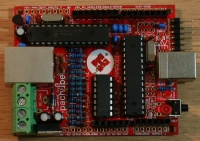Nanode/Nanode the sequel
nanode workshop - the sequel
Contents
saturday 10h30 till sunday afternoon[edit]
before noon: prep[edit]
- soldering your nanode : there are some nanode available at the hackerspace (at 31.41592EUR) , check with ptr_
- do this soldering job preferably the day(s) before the workshop, so we can start doing some real work from the start of the workshop
- installing the arduino v1.0 IDE + the EtherCard library
- write a small firmware to your nanode (you'll need an ftdi cable for this, try to find one), test basic functionality
after noon[edit]
- C introduction / refresher
- variable types, program structure, arrays & pointers
- serial input/output
- a quick overview of arduino & ethercard libraries
- basic networking 101 (ipv4)
- an IP packet : headers & payloads
- a big burito : ethernet / IP / TCP
- shouting out loud in the (sub)net'hood : the LAN
- your packet exploring the world : IP routing
evening[edit]
- parsing IP packets
- protocol: how control exists after decentralisation;
- don't let the RFC bite you
- wireshark : checking the bits and byte'ing back
sunday[edit]
prenoon[edit]
- 10h30 till 14h : visit to the fleemarket, buy some crazy gear to play with
afternoon[edit]
- some practical applications
- come over to work on yr project & get some advice
ethercard library https://github.com/jcw/ethercard
what's important :
- the 'buffer' (enc28j60.h: static uint8_t ENC28J60::buffer[] ) : memory buffer where EtherCard::PacketReceive and EtherCard::PacketSend write/read from / within the library it's defined as gPB (the global packet buffer)
- EtherCard::PacketReceive (enc28j60.h / enc28j60.cpp) : will write the received packet to the buffer
- EtherCard::PacketSend (enc28j60.h / enc28j60.cpp) : will send the packet buffer onto the wire
- EtherCard::packetLoop (tcpip.cpp) : handles ICMP responses & TCP handshakes
what's in my IP packet - structure & parsing - wireshark to the rescue - make a small UDP server - using the lowlevel functionality of your hardware - do a tcp handshake : preserving state of a connection (ipv4 only for now, will have a look at ipv6) HTTP 101 - using web services (post your sensor data to a webserver) abusive DHCP client - make your network suffer a bit
saturday-evening:
practical use of some environmental sensors to control & monitor
your mushroom-grow chamber
Monitoring: Pachube/ sensors, Controling the enviroment with relays.
sensors & dev :
* LDR: 100%
* Thermistor: 100%
* Hygrometer: 70% Frequency not well defined.
Relay box: 100% Your project in a PCB: 80%
Item's lists:
Nanodes Cables Leds Sensors LDR, Thermistors, Hygrometer Transistors Resistances Relays PCB/ Project boards BlackBoxes
TO DECIDE:
Wich library will be used
TO DO:
Software:
TLDR: How to set up an scale. Home made calibration Hygrometer: Fix the frequency in order to get the right results. Set up the PCB final design (Fritzing :s ?). ***1 Proposed Initial code, incremental code (steps) & final code. Call for buying missing Nanodes (also maybe to offer to sell the ones that people dont use)
Hardware
- hsbxl electronics lab - nanodes - soldering irons ftw - we need more 'ftdi' serial cables ! (probably Nico)
Known Issues:
* Problem:UDP project was done with the new library. Pachube client works on the old one.
Solution 1: can do udp with anything, just need memory buffer of the packet. Solution 2: To fix the new library pachube problem (I have not documented the problem).
* connecting an LCD screen is not possible due to lack of pins
Solution 1: Shift register (looks too complex)
Links
LDR / Lux http://www.engineeringtoolbox.com/light-level-rooms-d_708.html http://en.wikipedia.org/wiki/Photoresistor http://embedded-lab.com/blog/?p=4330 http://www.farnell.com/datasheets/56196.pdf http://dangerousprototypes.com/2012/01/20/digital-light-intensity-meter-with-a-calibrated-ldr/
New Library Ethercard Examples: Pachube, RestDuino, Ntp
https://github.com/thiseldo/EtherCardExamples
